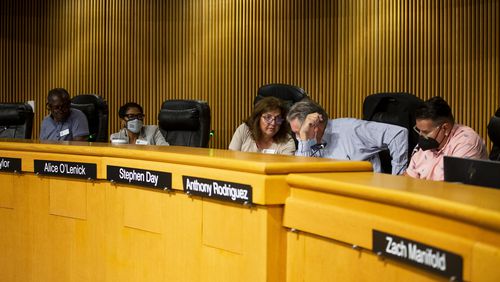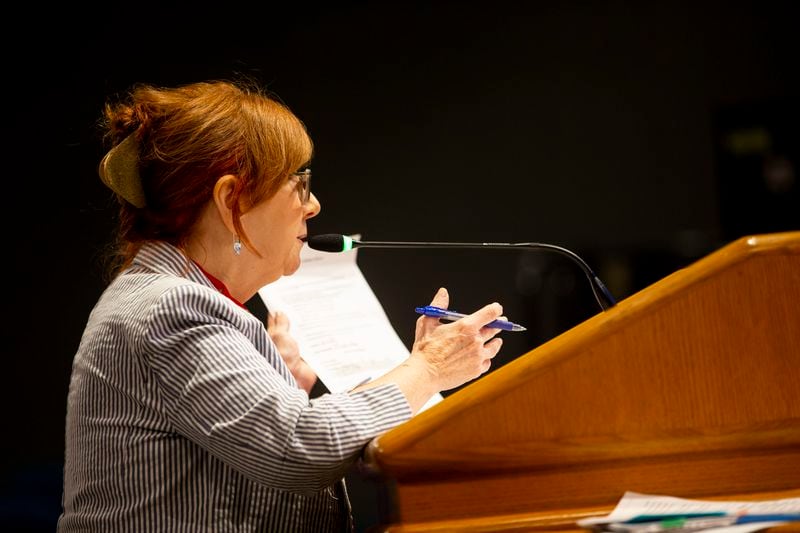Bearing long lists of voters’ names, a determined group of Republicans is asking local election boards to cancel thousands of Georgia voter registrations, using a new power bestowed by the state’s voting law.
These amateur operatives are trying to purge the registrations of people who they suspect have moved away based on voter lists, address records or property tax documents.
They’re relying on Georgia’s law passed last year in the wake of Donald Trump’s defeat in the 2020 election that allows any voter to challenge the eligibility of an unlimited number of their neighbors, an effort that’s taking place outside the routine government-run process of removing people who have moved or died.
It’s voter against voter, with conservatives taking matters into their own hands to police Georgia’s voter list. No fraud has been proved among registrants who moved from Georgia or used P.O. boxes as their addresses.
These aggressive efforts to cancel voters jeopardized eligible voters such as Tracy Taylor, who is homeless and registered to vote at the address of a post office near historically Black colleges on Atlanta’s Westside.
“If I had a residential address, I would be using it,” Taylor told the Fulton County elections board this month. “I’m trying to get back to a normal life.”
Election officials decided to remove about 280 voters out of about 1,500 challenges it considered that day. Taylor was told to re-register at a courthouse address.
The challengers say they’re not targeting anyone based on their political beliefs or voting record. Instead, they say they’re comparing voting lists and change-of-address records to find individuals whose names could be used to cast illegal votes in the future, even though Georgia requires voter ID before casting a ballot.
Credit: Chris Day
Credit: Chris Day
“I have a real problem when there are voters with registrations in other states. They’re not nefarious, but it opens the door for someone else who might use those registrations,” said Merrybelle Hodges, a conservative voter from Duluth who challenged over 100 Gwinnett County registrations last week. “If voters are registered in several states, it waters everyone’s vote down.”
The Gwinnett elections board voted to send notification letters asking voters to confirm their addresses rather than immediately cancel them.
Georgia already had some of the nation’s most rigorous voter cancellation practices, removing nearly 1 million outdated registrations over the past five years, including 534,000 in 2017, which is believed to be the largest mass cancellation in U.S. history.
But federal and state laws call for a deliberate process that can take several years to cancel voter registrations. The government mails letters to voters whose addresses have changed, and those who don’t respond can be removed if they miss the next two general elections. Those who confirm they’ve moved are canceled without delay.
Voter challenges provide a method to speed up cancellations. If county election boards uphold allegations that voters are ineligible, they’re removed from Georgia’s voter rolls right away. It normally can take over eight years for a dormant voter registration to be removed from Georgia’s list of registered voters, according to state law.
So far this year, over 25,500 voter registrations have been challenged and more than 1,800 of them have been removed in Chatham, Cobb, DeKalb, Fayette, Forsyth, Fulton, Gwinnett and Spalding counties, according to a count by the voting rights organization Fair Fight Action.
“These are essentially vigilante voter purges,” said Esosa Osa, deputy executive director for Fair Fight Action. “It’s a duplicative process that doesn’t really serve a purpose since the state already has a process for list maintenance.”
The Republican-controlled Georgia General Assembly last year empowered residents to challenge the qualifications of as many voters as they want within their county, part of the state’s voting law passed in reaction to Trump’s fraud conspiracy claims. The law also limited absentee ballot drop boxes, imposed new ID requirements for absentee voters and banned handing out food and drinks near polling places.
Even before the new law, a large effort by the Texas-based group True the Vote and members of the Georgia Republican Party disputed the eligibility of 360,000 voters in late 2020. Most of those challenges fell short, ultimately resulting in a few dozen disqualifications.
This time, local Republican voters are filing voter challenges without explicit coordination by any organization. An Atlanta attorney who is listed as a member of the Republican National Lawyers Association, Dave Baker, has attended hearings in support of the challengers but didn’t respond to messages seeking comment. Georgia Republican Party Chairman David Shafer also didn’t return a message seeking comment.
The Republicans who bring challenges often deny any coordination with a political party or nonprofit group, but they never disclose who provided them with information about potentially ineligible voters, which can be derived from publicly available voter lists.
In Georgia, it costs $250 to order a complete list of the state’s 7.7 million registered voters, and voter records are also posted online by an organization called the Voter Reference Foundation, a subsidiary of the conservative group Restoration Action.
County election boards are required to hold hearings on challenges within 10 business days, but they usually reject challenges unless there’s conclusive evidence that a voter is no longer eligible in Georgia. Change-of-address information alone is inadequate because Georgians could own homes in multiple states.
In Forsyth County, election officials voted unanimously to dismiss a challenge of 12,880 voters in May, just before the primary.
“This is clearly an attempt to take people off the voter rolls. It’s just not right,” said Anita Tucker, a Democratic Party appointee on the Forsyth board. “Most people, if they move, they register and vote in their new state, but they don’t come back to Georgia to vote.”
The Forsyth board has removed a total of 108 voters out of 16,400 challenges filed since February, according to Tucker’s accounting.
Voting in two states is illegal, but it’s rare, with very few cases brought to the State Election Board over the years, according to government records.
“There’s not any threat to the democratic process by somebody being on the voter rolls for a particular period of time. Challenges presume that somebody has moved and they’re going to try to vote improperly, and there’s absolutely no evidence of that,” said Dele Lowman Smith, a Democratic appointee to the DeKalb County elections board.
Alice O’Lenick, a Republican appointee to the Gwinnett elections board, said during a challenge hearing last week that it’s clear to her that voters who moved out of state should be removed.
“If you don’t live in the state of Georgia, you should not be allowed to vote in the state of Georgia,” O’Lenick said. “If we leave this person on the rolls knowing that they’re paying property taxes and vehicle registration taxes in a different state … they can show up and they can cast an absentee ballot.”
The Gwinnett board, following advice from a county attorney and the election director, decided to send letters to challenged voters asking whether they had actually moved instead of canceling them without further notice.
The Georgia secretary of state’s office has begun updating the voter rolls more regularly since last year when it began participation in the Electronic Registration Information Center, a 31-state organization that exchanges voter information.
ERIC informs Georgia election officials when someone registers to vote in another state, obtains a new driver’s license, or changes his or her address. Those voters are then mailed letters to confirm they’ve moved, starting the cancellation process.
Election officials mailed notifications this summer to as many as 142,000 voters who appear to have moved.
Fulton County election board Chairwoman Cathy Woolard, who was appointed by the chairman of the County Commission, said she’s worried that Georgia’s voting law pits residents against each other when bringing challenges.
“I don’t think that’s how we do things in this country,” Woolard said. “We’re as interested as everybody else in having a clean voter list, but this piecemeal approach doesn’t really get us there. It creates a lot of concern and anxiety among people that another citizen is doing something to challenge their right to vote.”
About the Author









